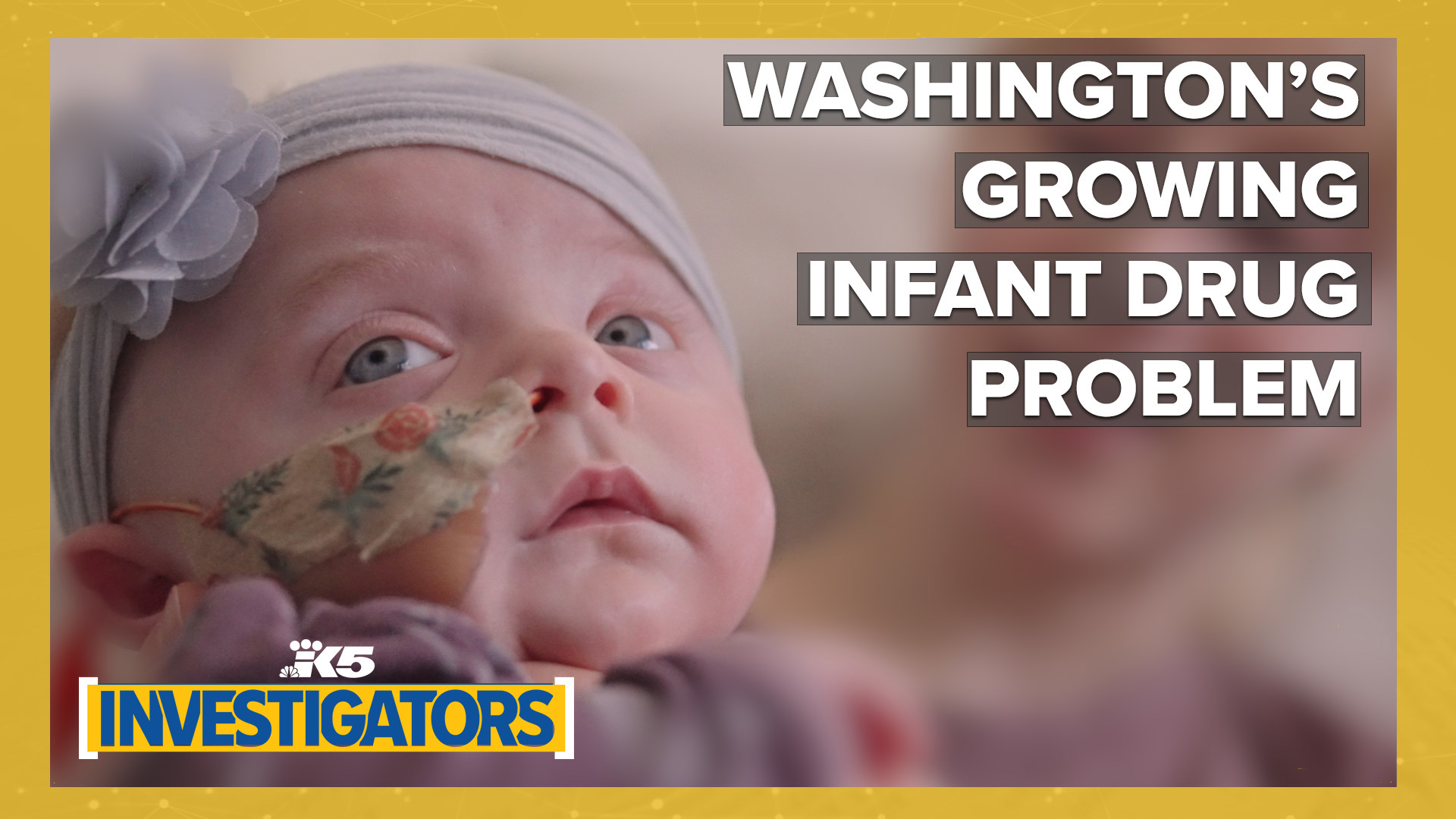SPOKANE COUNTY, Wash. — Newborn babies in Washington are testing positive for drugs at rates far exceeding the national average, the KING 5 Investigators uncovered.
Three mothers in various stages of recovery shared their experiences using drugs during pregnancy and their path to becoming sober.
Their babies had withdrawal symptoms, a condition medically known as neonatal abstinence syndrome (NAS).
"Every day, I was crying because of the guilt and shame," Ciara said. "I didn't know how to ask for help."
Another mom, Alexia, said it’s been difficult to watch her son Jackson exhibit symptoms.
"He had some tremors established," Alexia said. "That was always hard to watch. You don't want to see your baby in any pain, but not everybody is that lucky. I've seen babies going through some pretty horrific withdrawals."
The numbers
Federal records show declining rates of babies born with NAS across the country, but the KING 5 Investigators found Washington faces a troubling exception.
A recent Washington State University (WSU) report revealed that in 2022, babies born with NAS dramatically exceeded the national average by nearly double.
Since this WSU report was published, new federal data for 2022 shows an even wider gap. While the national average continues to trend downward, Washington’s rates — especially in Spokane County — are shooting up.
According to the WSU report, Spokane is at the epicenter of this crisis, labeled as an "area of heightened concern." In Spokane County, nearly three and a half times the number of babies are born with NAS compared to the national average.
"It is concerning that we have higher numbers," said Dr. Eka Burduli, who was the principal investigator of the report and an associate professor at WSU. "Indeed. It's telling me that we have too many families that are not getting the care they need and not getting the support they need, in this county and in the state."
The causes
What’s behind these exceptionally high rates of drug-affected babies in Washington?
Burduli said there are many potential factors, including a lack of resources, differences in state-by-state reporting of NAS and poverty.
Research shows substance abuse is more prevalent in homeless populations. Washington ranked third nationwide for homelessness in a 2024 congressional report, trailing only New York and California.
"We know that there's a strong correlation between having substance use disorders and having mental health issues and being in poverty," Burduli said.
Mothers like Erin said it could be Washington's drug policies. In 2021, Washington downgraded drug possession to a misdemeanor.
"There's not really very many like, punishments for people doing drugs," Erin said.
"The assistance ends up just allowing them to continue to do drugs, but more comfortably," Alexia said.
As for Spokane, the federal government said it's a "central hub for narcotics distribution" because of its proximity to Canada and Interstate 90.
The solution
One potential solution is Maddie's Place in Spokane. It is the only facility in the state and one of five in the country that provides housing and treatment for mothers and their infants together.
State leaders said treatment must be the priority to tackle the state's fentanyl problem. According to state records, five agencies offer inpatient services to mothers in recovery and allow children to stay with them.
Maddie’s Place stands apart from these facilities. They have specialized nurses who treat the infants in withdrawal.
"There was nowhere else for us to go," said Alexia, who wants more options for mothers and babies. "Before we heard about this place, there was a strong possibility that they were going to take my son if this place wasn't here. I hope that people will see that this place fills a big need.”
Maddie's Place has served as a lifeline for these mothers. It provides housing, medical treatment and recovery services.
"There's no resource in the state that provides what we're providing, which is to the mom and the baby during this critical time where you're actually licensed to treat the baby and then at the same time, you're really treating the mom too," said Shaun Cross, Maddie's Place president and CEO.
Cross said their model is a success.
Since opening, they've served 122 babies, with 95% staying with their parents, rather than going into foster care. He said they are cheaper than a hospital.
"We're really changing the trajectory of the infant’s life and the trajectory of the parent’s life," Cross said.
The funding crisis
Despite its success and plans to expand, Maddie’s Place is facing a crisis.
"We are at risk of losing our funding and not having it continued," Cross said. "We're at risk of closing."
If Maddie's Place loses its state funding, it could close in six weeks.
They're asking the legislature for $2.2 million. It's money that would be added to the governor's already-strapped budget.
Advocates argue the high number of affected infants in Washington means Maddie's Place needs to be a priority.
"Unfortunately, there's a lot of people out there who need the same help we did and there's just no place for it," Alexia said.
Cross said the state should listen to the data.
"We should have alarm bells that are going off," Cross said. "And I don't care what the budget crisis is in the state of Washington. This should be our number one priority in dealing with this. We're in a freefall."
Gov. Bob Ferguson will finalize the state budget on April 27.

